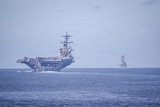Neptune expands into port crisis management training
Neptune Maritime Security is assisting major ports across Asia, the Middle East and Africa address security threats, with the delivery of crisis management training to bolster defences amid increasing instability in the regions.
The company has provided personnel to perform bespoke risk assessments and carry out specialist training for security officers and senior personnel. The work is designed to help ports manage their emergency response capabilities to scenarios including terror attacks and suicide bombers, kidnap, civil unrest and uprisings.
Jeremy Johnson, business development manager, Neptune Maritime Security, said that major port operators are becoming increasingly aware of potential risks at their facilities worldwide.
‘Companies must not only meet International Ship and Port Security (ISPS) Code standards and meet routine health and safety requirements but also ensure their emergency response plans are updated,’ he said. ‘We have a successful track record of providing specialist security and risk management solutions in ports and shore-side industrial and petro-chemical facilities around the globe, as well as our background as a trusted and professional private maritime security company in vessel protection.’
He added: ‘Using our experience in creating emergency response plans, a thorough understanding of the ISPS Code and health and safety planning, we have been able to provide clients with the necessary skills to enhance their businesses in hazardous countries while ensuring the safety of staff and operations and reducing potential liabilities.
‘Mitigation is always the safest plan of action whether it is for shipping, ports, shoreside and offshore facilities, or cruise terminals.’
Neptune services include a risk assessment, with a risk register drawn up with possible impact and company liabilities from a wide range of potential factors, including economical, operational and environmental incidents as well as potential disruption caused by local community action which could affect production. The client is then able to select training options, with exercises carried out in the classroom, as well as in ‘real world’ situations.
The services are part of Neptune’s expansion plans as it aims to drive up standards in the maritime security sector and diversify its operational range. The company provides specialist security services, including armed protection, for the international maritime community.
More from Naval Warfare
-
![Spain’s F100 upgrade mirrors Aegis modernisation paths in allied navies]()
Spain’s F100 upgrade mirrors Aegis modernisation paths in allied navies
The Spanish Navy’s Alvaro de Bazan-class of air defence frigates will receive the latest Aegis Weapon System technology among other modernisations to extend the service life to 2045.
-
![UK’s Fleet Solid Support ship programme deemed on track despite steel supply concerns]()
UK’s Fleet Solid Support ship programme deemed on track despite steel supply concerns
Shipbuilders are saying the programme is going ahead on time as the government estimates 7.7 million tonnes of steel are needed for 2026 infrastructure projects.
-
![As Indonesia doubles up its order, who else is looking at the Arrowhead 140 frigate design?]()
As Indonesia doubles up its order, who else is looking at the Arrowhead 140 frigate design?
The adaptable design of Babcock’s Arrowhead 140 frigate, already selected by the UK Royal Navy and Poland, has led to more orders from Indonesia while other countries continue to weigh it up.






















